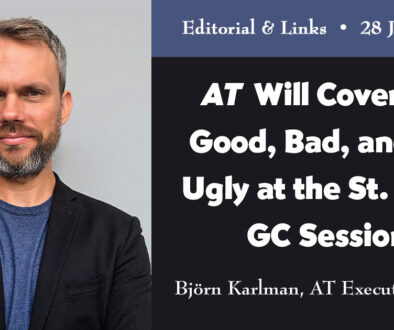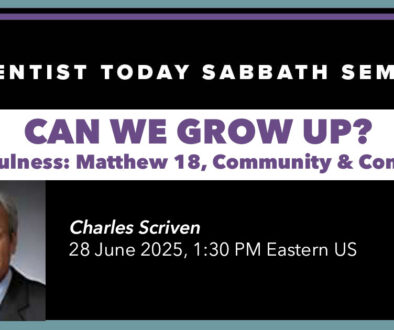Creating Holy Atmosphere: How the Trans-European Division Redefined Youth Conferences
1 April 2025 |
The Lord called Samuel three times before the young man responded: “Speak, Lord, your servant is listening” (1 Samuel 3:10). Moses answered God’s call and was instructed to remove his shoes, as “the place where you are standing is holy ground” (Exodus 3:4-5).
These verses set the tone for the Trans-European Division’s GAiN Gen Z convention, redefining youth conferences from usual pandering-to-young-people, to a spirit-centered call to action.
GAiN is a ministry of the Communications department of the General Conference. This convention, held from February 28 to March 2, focused exclusively on Gen Z. It was the first of its kind for the division. Communications Director David Neal and Associate Communications Director Vanesa Pizzuto expressed their desire to create a “holy atmosphere” for the 18-29-year-olds attending from across Europe. By God’s grace, they succeeded in doing so. For three days, there was a tangible feeling of being on holy ground.
We often think of a “holy atmosphere” as a spiritual high, a euphoric sense of divine connection that tends to fade once the chairs are stacked and the goodbyes are exchanged. Here, the atmosphere of engagement was a direct result of its thoughtful organization. From the event planners of the Trans-European Division and Inter-European Union to presenters Dr. Seth Pierce and Kevin Wilson and the worship leaders, there was a genuine respect extended toward the attendees. While it should be a universal standard, this kind of approach is actually quite rare. Many youth-focused conventions, whether for local churches or unions, often miss the mark, trying too hard to seem relevant with half-hearted attempts at slang, awkward icebreakers, trivial games that can feel irreverent, and bags filled with plastic trinkets. I recall one occasion when I spoke at a youth retreat where there was even a literal light show with a smoke machine in the gymnasium.
There might be an introduction by youth pastors who believe themselves more “in touch” than they actually are. Most statements usually express the importance of “our young people” rather than addressing them as individualized followers of Christ. Then there is a lackluster song service with praise music that relies on repeated verses to invoke thoughtfulness, usually leading to what I like to call “worship exhaustion” before the participants are talked at rather than engaged with. On either end, they leave high on empty calories, or at best with mild inspiration.
An added reality is that in North America, Christianity is the norm; even those unfamiliar with Adventism are typically aware of its basic tenets. However, in places such as Latvia, Cyprus, Hungary, Turkey, Scotland, Ireland, and Croatia, Christianity is a minority, and Adventism is even farther from the national average. As young people from various nationalities gathered in the room, there was a palpable awareness that every attendee was engaged and attentive. Throughout the convention, participants shared stories, asked questions, and interacted with a focus that felt refreshing. The attendees chose to be there not just because it was part of the Adventist youth package, but out of a profound understanding that this faith should not be taken for granted. In short, they cared.
Speakers at these events frequently tell participants, “Don’t let anyone dismiss you because you are young,” “You are a valuable asset to the church because of your youth,” and “As your elders, it is our responsibility to help guide you.” There is a constant reminder that young people are the future of the church—but not in the present; they are told to prepare for that future, which may come in 20 or 30 years. Ultimately, many youth events pander to young people, projecting adult pastors’ perspectives on what they believe young people want. This approach treats today’s youth as if they need constant audio-visual stimulation to stay engaged.
What made the GAiN Gen Z event so remarkable was its intentional simplicity. Pizzuto and Neal were not trying to prove relevance to an ever-shifting cultural marker. Instead, every organizer showed up with an authentic investment, fostering safety and attentiveness for the participants. The worship continued the authenticity, choosing songs that encouraged call and response, leading to a choir-like fullness. Each presentation by Dr. Seth Pierce and Kevin Wilson over the three days was practical and inspiring, never framing the content through the lens of the audience’s age.
Held on the beautiful Newbold College campus in Bracknell, England, the event felt like a peaceful oasis, surrounded by lush gardens and adorned with cozy couches. This inviting environment encouraged relaxed conversation, replacing the sterile atmosphere of a conventional convention hall with the comfort of a living room. This element of intimacy significantly elevated the overall experience.
Attendees were mingling, bonding, and engaging in discussions; this was not a passive experience but rather a training ground for deeper understanding. Many participants were social media leaders from their small conferences or churches, eager for insights on how to maximize their ministry efforts. Without the busy work of back-to-back programming, the attendees had time to evolve their ideas and develop relationships. During breaks, small groups of students gathered on couches, sharing ideas for outreach, discussing methods for content creation, and exploring ways to distill theological concepts into compelling 30-second videos. They were enthusiastic, motivated, and hopeful. By the end of the event, most of the young adults started planning their own events and outlining actionable steps for developing YouTube channels, social media accounts, and podcasts to enhance the kingdom of God. They left with the conviction that they were equipped to become leaders, ready to continue their ministry with greater clarity and solid backing from their church.
The event organizers also ventured into uncharted territory by hosting a communications conference specifically for Gen Z. They planned each step with care and a sincere desire to create a sense of belonging for young people, who often feel like a minority in their culture. With this goal in mind, the Trans-European Division can confidently claim that GAiN Gen Z was a resounding success.
Not only did the event elevate the standard for youth church conferences, but it also allowed me to redefine the expectations of what constitutes a “holy atmosphere.” Instead of relying on the excited highs of worship programming driven by buzzwords and superficial encouragement, we embraced the idea of holy ground as a space that holds profound significance, encompassing both celebration and reverence. The Lord spoke, and His children were listening; like in 1 Samuel 3:19, not a single word fell to the ground.




